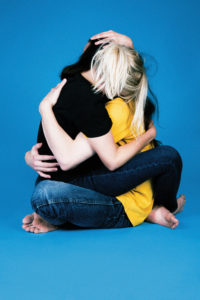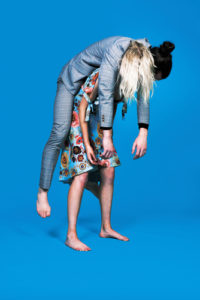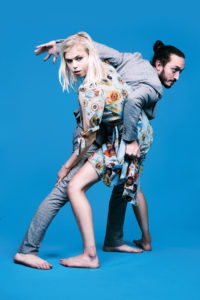We sat down with Iskandar R. Sharazuddin, the writer of the new show Post-Mortem, to talk about relationships, physical theatre, and pallor mortis.
Describe Post-Mortem in 3 words:
Love, Trauma, Past.
What inspired you to make this show?
The show explores the relationship between two high school sweethearts who haven’t spoken in ten years, what happened there…?
What happened is that like a lot of teenage sweethearts they separated, but their separation was under some pretty hard circumstances. Nancy & Alex were thrown into a very grown-up situation and tried their best to be very grown-up about it. The pressure of that situation broke the relationship apart, nearly caused permanent mental damage, and evolved into a physical and emotional distance which neither of them was ready or able to confront.

They meet again at a wedding… speaking from experience at all?
Sort of. Nancy and Alex are composites. I have drawn from my first relationship, my relationship as an actor with Imogen Irving (the woman in the show image), and completely fictional elements.
Do you think Nancy & Alex represent a typical couple?

The show is partly physical theatre – why did you decide to use movement in the show?
It has movement sequences associated around the stages of decay a body goes through after death. That is quite a grim concept and it isn’t as dark as you would think. Nancy & Alex are revisiting their relationship after is has ended (died) to assess what went wrong, that is the very definition of a post-mortem. The stages of body decomposition have very physical & emotional ideas attached to them i.e rigor mortis has a stiffness to it, where as pallor mortis (the paleness that appears after death) has a sense of coldness to it. I wanted to use these stages of decay as a scaffolding upon which I could hang the narrative. When I was thinking about them, I was wondering how to realise them and kept coming back to physical choices. From there I expanded and wondered what it would look like if those moments became completely physical. I also have a physical vocabulary as a performer so a natural tendency or inclination to lean towards physicality to build character or narrative.
How do you combine this with script?
I don’t know. This is a big challenge. In some ways the text and movement exist in separate spaces but feed one another and support the same story. I have never done anything like this before which is a little scary but that often means it is something you should jump into with two feet. As we develop the piece further it would be interesting to me to find ways in which the physicality can bleed more into the naturalism and vice-versa.

What’s the main discussion you want audiences to have in the bar afterwards?
I want people to come out and talk about their first love. Sometimes those experiences were painful, sometimes overwhelmingly disappointing, or funny, or heart-breaking. Sometimes people are still with that person. However, I think one common factor in a lot of people is that they mythologise their own pasts. I feel we place these relationships on pedestals, or sweep them under rugs, we do our best to forget them, or to glorify them. They are such crucial experiences, integral to our learning, and often can really shape who we become. I think it is important to not mythologise them and remember them as they were, what they taught us, and what we’ve taken from them. Sometimes it is fun to look back, and that is OK, in a world that is constantly looking forward I get lost a lot of the time and have to look back to work out where it is I am going next.
Post-Mortem is Running until the 20th of April, you can find out more and book tickets here.